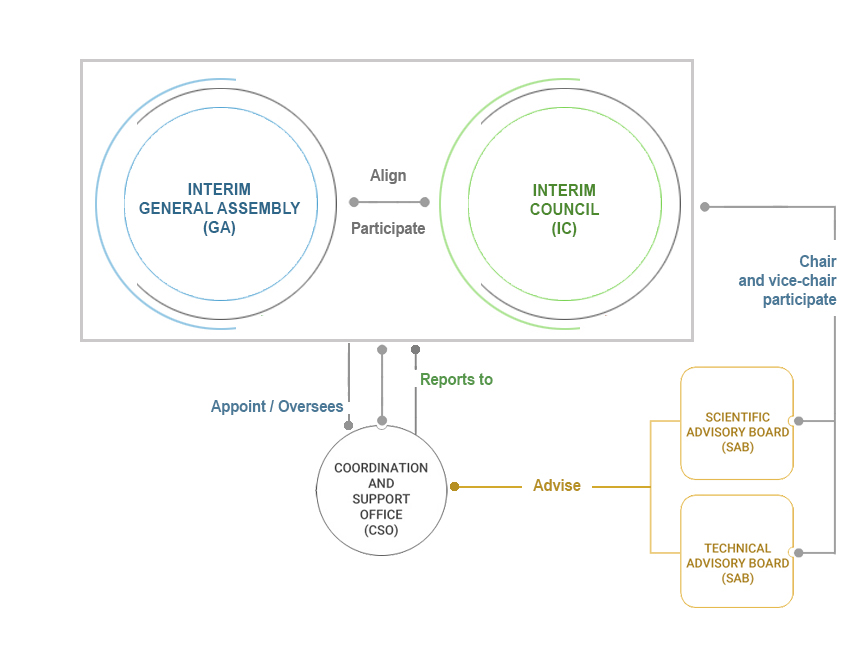Steering the future Research Infrastructure
Governance and funding
As DiSSCo navigates the implementation and operation phases of its lifespan, the models of governance and management of the future RI demand refinement and adjustment. To ensure coordination and strategic alignment during the preparatory and implementation phases (2019-2025) DiSSCo has established an interim model of governance. As DiSSCo approaches the beginning of operation, this model will be phased out and replaced by the permanent governance of DiSSCo stipulated by the provisions of DiSSCo ERIC.

The interim General Assembly (iGA)
The iGA is currently the ultimate governing body and will continue to be so until the constitution of DiSSCo ERIC. Bringing together two representatives from the facilities which are currently committed to the development of the RI, the iGA oversees the progress of the different work programmes, associated projects and work towards the development of national-level DiSSCo nodes. In these hubs, all facilities of each country, which participate in DiSSCo, join forces and align positions in the light of national strategies.
DiSSCo Coordination and Support Office
DiSSCo ‘s iGA counts on the help of the Coordination and Support Office (CSO). Led by DiSSCo’s Coordinator, the CSO’s mission is the implementation of the work programmes relevant to the development of the infrastructure under the preparatory, transition and construction phases. You can meet the CSO team here.
The Advisory Boards
The mission of DiSSCo’s advisory boards, the Scientific Advisory Board (SAB) and Technical Advisory Board (TAB) is to provide expert consultation services in all matters relating to DiSSCo’s scientific mission (SAB) and the technical operation (TAB).
The two advisory boards consist of international experts who are expected to draw on their knowledge and experience to provide objective, well-considered advice. Both boards operate independently.
Members of the SAB
Sandra Knapp (Chair) National History Museum (UK)
Philippe Grancolas (Vice-Chair) MNHN (FR)
Sally Chambers Ghent University (BE)
Paul Kersey Royal Botanic Gardens, Kew (UK)
Kerstin Lehnert Columbia University (US)
Vânia Ferreira DiSSCo CSO (NL)
Ian Owens Smithsonian Institution (US)
Marjo Saastamoinen University of Helsinki (FI)
Michele Tixier-Boichard INRAE (FR)
Rutger Vos Naturalis Biodiversity Center (NL)
Members of the TAB
Larry Lannom (Chair) CNRI (US)
Pier Luigi Buttigieg Alfred Wegener Institute (DE)
Rob Hooft Health-RI (NL)
Vânia Ferreira DiSSCo CSO (NL)
James Macklin Government of Canada (CA)
Wouter Addink DiSSCo CSO (NL)
Engaging national governments: the Interim Council
DiSSCo’s governance has taken a crucial new step with the inauguration of the Interim Council, the body that replaces the former Funders Forum.
The new Interim Council will have a more executive character than the Funders Forum insofar as it is expected to steer DiSSCo’s actions in two areas: the negotiation and submission of the finalised ERIC application to the European Commission and the design and approval of the necessary policies and strategies to be implemented during the early stages of DiSSCo’s Construction Phase.
Being the Interim Council a decision-making body, the question is how it will cohabitate and collaborate with another decision-making body, i.e. the scientific and technical community of DiSSCo, represented in its general assembly. The answer to that question is quite straightforward. The Interim Council will focus on matters related to the operation of the ERIC -legal, organisational, and financial- while DiSSCo’s iGA will take care of the scientific and technical roadmap to the future Research Infrastructure. Besides, the Interim Council will invite scientific and technical representation so that the view is more integrated.
The Interim Council will consist of ministerial and scientific representatives from all DiSSCo countries, CETAF, and institutions from countries without established nodes. Voting rights, however, will be limited to countries that formally express their commitment to becoming founding DiSSCo members. The rules of procedure for the Interim Council were approved during the new body’s first inaugural meeting on Sept 23, 2024.

